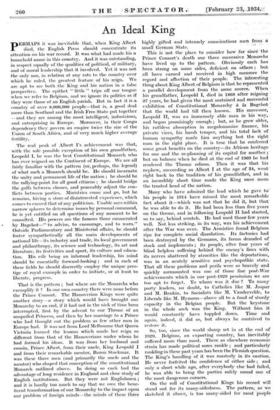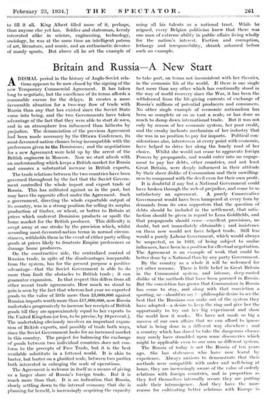An Ideal King
PERHAPS it was inevitable „that, when King Albert died, the English Press should concentrate its attention on his war record. It was what had made his a household name in this country. And it was outstanding, in respect equally of the qualities of political, of military, and of moral leadership that it involved. Yet it was not the only nor, in relation at any rate to the country over which he ruled, the greatest feature of his reign. We are apt to see both the King and his nation in a false perspective. The epithet " little " trips off our tongue when we refer to Belgium, and we ignore its politics as if they were those of an English parish. But in fact it is a country of over 8,000,000 people—that is, a good deal more than Scotland and the Irish Free State put together —and they arc among the most intelligent, industrious, and enterprising in Europe. Moreover, in their Congo dependency they govern an empire twice the size of the Union of South Africa, and of very much higher average fertility.
The real peak of Albert I's achievement was that, with the sole possible exception of his own grandfather, Leopold I, he was the best Constitutional Monarch who has ever reigned on the Continent of Europe. We are all fairly familiar with the pattern (or, perhaps, the legend) of what such a Monarch should be. He should incarnate the unity and permanent life of the nation ; he should be the rallying-point for all good citizens ; he should bridge the gulfs between classes, and peaceably adjust the con- flicts between parties. Ministries come and go, but he remains, hiving a store of disinterested experience, which comes to exceed that of any politician. Unable save within narrow spheres to determine issues by personal command, he is yet entitled on all questions of any moment to be consulted. His powers are the famous three enumerated • by Bagehot—" to advise, to encourage, and to warn." Outside Parliamentary and Ministerial affairs, he should foster sympathetically all the main developments of national life—its industry and trade, its local government and philanthropy, its science and technology, its art and literature, its festivities and sport, its culture and educa- tion. His role being an informal leadership, his mind should be essentially forward-looking ; and in each of these fields he should discreetly employ the unique pres- tige of royal example in order to initiate, or at least to liberate, progress.
That is the pattern ;. but where are the Monarchs who exemplify it ? In our own country there were none before the Prince Consort. The Hanoverian Kings were quite another story—a story which would have brought our Monarchy to an end, if it had not in the nick of time been interrupted, first by the advent to our Throne of an unspoiled Princess, and then by her marriage to a Prince who had thought out the problem as few other men in Europe had. It was not from Lord Melbourne that Queen Victoria learned the lessons which made her reign so different from that of the Hanoverians under whom he had formed his ideas. It was from her husband and cousin, Prince Albert, from their uncle, King Leopold I and from their remarkable mentor, Baron Stockmar. It was these three men (and primarily the uncle and the mentor) who shaped that conception of the constitutional Monarch outlined above. In doing so each had the advantage of long residence in England and close study. of English institutions. But they were not Englishmen ; and it is hardly too much to say that we owe the bene- ficent transformation of our Monarchy to the impact upon our problem of foreign minds—ihe minds of theSe three highly gifted and intensely conscientious men from a small German State.
This is not the place to consider how far since the Prince Consort's death our three successive Monarchs have lived up to the pattern. Obviously each has been strong on some sides, deficient on others ; but all have earned and received in high measure the regard and affection of their people. The interesting thing about King Albert of Belgium is that he represented a parallel development from the same source: • When' his grandfather, Leopold I, died in 1868 after reigning ' 37 years, he had given the most sustained and successful exhibition of Constitutional Monarchy ct la Bagehot ' that the world had till then known. His successor, Leopold II, was an immensely able man in his . way, and began promisingly enough ; but, as he grew older, his ruthless absorption in megalomaniac finance, his private vices, his harsh temper, and his total lack' of ' human sympathy made him anything but the right man in the right place. It is true that he conferred ' some great benefits on the country—its African heritage ' for one and the re-planning of its capital for another ; but on balance when he died at the end of 1909 he had rendered the Throne odious. Then it was that his nephew, succeeding as Albert I at the age of 34, went right back to the tradition of his grandfather, and- in an incredibly short time made the King once more the trusted head of the nation.
Many who have admired the lead which he gave to" his people in 1914 have missed the most remarkable fact about it—which was not that he did it, but that he was able to do it. He had been less than five yeari on the throne, and in following Leopold II had started, so to say, behind scratch. He had used those few years well. Not less striking, in its way, was his achievement after the War was over. The Armistice found Belgium ripe for complete social dissolution. Its factories had been destroyed by the Germans, its farms denuded of stock and implements ; its people, after four years of - blind helpless suffering behind the enemy'S lines with its nerves shattered by atrocities like the deportation's, was in an acutely sensitive and psychopathic 'state. That all these problems and perils were so bravely and quickly surmounted was one of those fine post-War achievements which in our post-1929 pessimism We are w too apt to forget. To whom was it due ? To many' party leaders, no doubt, to Catholics like M. Jaspar and M. Renkin, to Socialists like M. Vandervelde, to Liberals like M. Hymans—above all to a fund of sturdy,- capacity in the Belgian people. But the keystone' in the whole arch was the King. Without him it would constantly have toppled down. Time and again, indeed, it did so, but always he contrived to restore it.
So, too, since the world slump set in at the end of 1929.. Belgium, an exporting country, has inevitably suffered more than most. There as elsewhere economic strain has made political sores rankle ; and particularly rankling in these past years has been the Flemish question: The King's handling of it was masterly in its caution. He never forfeited the confidence of either side ; and only a short while ago, after everybody else had failed, he was able to bring the parties safely round one of the most dangerous corners. • - On the roll of Constitutional Kings his record will stand out fOr its many-sidedness. The pattern, as `ce sketched it above, • is too many-sided for' most 'people to fill it all. King Albert filled more of it, perhaps, than anyone else yet has. Soldier and statesman, keenly interested alike in science, engineering, technology, sociology, he was at the same time an intelligent patron of art, literature, and music, and an enthusiastic devotee of manly sports. But above all he set the example of using all his talents as a national trust. While he reigned, every Belgian politician knew that there was one man of extreme ability in public affairs living wholly for the nation's interest. Faction and corruption, lethargy and irresponsibility, shrank ashamed before such an example.

















































 Previous page
Previous page